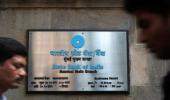Around 41 per cent of these companies saw such instances, compared to the global average of 29 per cent.
India’s number is higher than other countries such as the United States (26 per cent), the United Kingdom (32 per cent) and Japan (27 per cent).
It is also worse than other emerging markets. China had 39 per cent of firms affected by data theft. It was 19 per cent and 16 per cent for Brazil and Russia, respectively.
Illustration: Uttam Ghosh/Rediff.com

A significant proportion of Indian firms might have faced data theft issues recently.
Around 41 per cent of these companies saw such instances, compared to the global average of 29 per cent, showed a survey by a risk management and consultancy firm, released on Monday.
India’s number is higher than other countries such as the United States (26 per cent), the United Kingdom (32 per cent) and Japan (27 per cent).
It is also worse than other emerging markets. China had 39 per cent of firms affected by data theft.
It was 19 per cent and 16 per cent for Brazil and Russia, respectively.
The survey was released by Global Fraud and Risk Report 2019 by risk mitigation firm Kroll.
It had commissioned the study from Forrester Consulting, which did an online survey of 588 senior executives.
More than half of the respondents had annual revenues of a billion dollars or more.
Indian respondents numbered 58, said a spokesperson.
Leaks of internal information and reputational damage due to third-party relationships were among the other key incidents that significantly affected organisations in the past year, it said.
But companies may have become more careful.
“The country has recently been the setting for numerous high-profile data incidents, increasing organisations’ awareness of and emphasis on cybersecurity.
"This may be one reason respondents in India are more likely than the global average to say their cybersecurity systems are effective (88 percent vs 81 percent globally),” said the report.
The report also noted that around a third of Indian businesses experienced fraud last year.
Internal parties accounted for a greater proportion (33 per cent) of such frauds than external ones (31 per cent).
External party fraud is higher globally than those committed by internal parties.
“We believe that the level of due diligence done by Indian corporates is improving, but it is still below the basic requirement when compared globally,” said a statement from Tarun Bhatia, Head of South Asia and managing director in the Business Intelligence and Investigations practice of Kroll.
Corporate leaders also see geopolitical issues as a key risk.
Seventy-one per cent of Indian organisations are said to have been affected by tariffs and trade wars.
This is greater than the global average of 54 per cent.
Restrictions on foreign investments and newly imposed sanctions are also said to have affected companies.
Foreign investment restrictions hit 62 per cent of the firms. Sanctions affected 66 per cent of firms.
Companies see multiple potential risks over the next five years.
This includes a significant financial crisis, climate change and a ‘breakdown of intergovernmental mechanisms for dispute resolution, free trade, combating corruption...’











